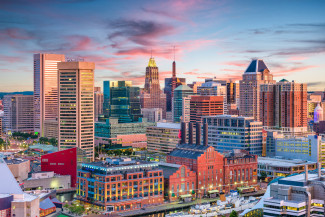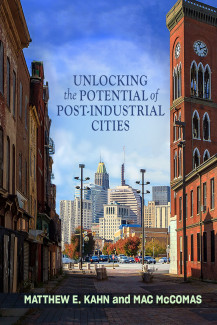
Johns Hopkins UniversityEst. 1876
America’s First Research University
Now Browsing:
Unlocking the Potential of Post-Industrial Cities

As urban economists, we are interested in everything that affects the economic well-being of people, businesses, and neighborhoods in cities. Cities are exciting and dynamic places where diverse groups of people benefit from close interaction. However, cities can simultaneously have negative side effects for residents and businesses. Children can be exposed to lead paint in old houses, which affects their cognitive reasoning and contributes to worse performance in school, and increases the chance of being involved in violent crime. Traffic congestion and the separation of places of residence from places with good jobs can make finding gainful employment a challenge. Old, post-industrial cities such as Baltimore, Detroit, and St. Louis have additional challenges with decades of population and job loss combined with the environmental legacy of former industrial sites. In all of these contexts, there is a pressing need to identify the right investment that can attenuate these ill effects and is feasible to implement. In our new book, Unlocking the Potential of Post-Industrial Cities, we explore the challenges faced by the six post-industrial cities of Baltimore, Cleveland, Detroit, Philadelphia, Pittsburgh, and St. Louis and provide a roadmap for knowledge of how to address these issues.

Complex problems such as high levels of violent crime and job loss do not have simple, silver bullet solutions. Let’s look at a hypothetical example. City officials in Cleveland notice that there are high levels of violent crime clustered around liquor stores in primarily residential neighborhoods. They decide to change the city’s zoning code to phase out liquor stores in residential areas of the city. The move sparks vocal criticism from the liquor store owner lobby in the state and they apply political pressure, as they worry that the business they poured their life savings into might be jeopardized. A group of residents in one of the neighborhoods where a liquor store will close tells their city council member that it is the only store in their neighborhood where they can buy food and cash checks. Other residents worry that once the liquor store closes, it will become a vacant building with all of the related problems. How can all of these parties have their concerns addressed while achieving the ultimate goal of violent crime reduction and neighborhood economic improvement? This is where urban economists can provide insight to policymakers by providing a roadmap for investment and policy evaluation.
Our book explores why six post-industrial cities have underachieved in recent decades and what steps they can begin to take to make a comeback. While cities such as Baltimore have received negative press in recent years, we are optimistic about their future and ability to provide people and businesses with the opportunity to achieve their full potential. Success ultimately depends on innovation, experimentation, honesty, and transparency, and making the right set of investments in people and places.
Order Unlocking the Potential of Post-Industrial Cities at the following link: https://jhupbooks.press.jhu.edu/title/unlocking-potential-post-industrial-cities
Matthew E. Kahn is a Bloomberg Distinguished Professor of Economics and Business at Johns Hopkins University, where he is the director of the 21st Century Cities Initiative. He is the author of Climatopolis: How Our Cities Will Thrive in the Hotter Future and the coauthor of Blue Skies Over Beijing: Economic Growth and the Environment in China. Mac McComas is the senior program manager for Johns Hopkins University's 21st Century Cities Initiative. Together, Kahn and McComas are the authors of Unlocking the Potential of Post-Industrial Cities.


Image: Baltimore, Maryland
Complex problems such as high levels of violent crime and job loss do not have simple, silver bullet solutions. Let’s look at a hypothetical example. City officials in Cleveland notice that there are high levels of violent crime clustered around liquor stores in primarily residential neighborhoods. They decide to change the city’s zoning code to phase out liquor stores in residential areas of the city. The move sparks vocal criticism from the liquor store owner lobby in the state and they apply political pressure, as they worry that the business they poured their life savings into might be jeopardized. A group of residents in one of the neighborhoods where a liquor store will close tells their city council member that it is the only store in their neighborhood where they can buy food and cash checks. Other residents worry that once the liquor store closes, it will become a vacant building with all of the related problems. How can all of these parties have their concerns addressed while achieving the ultimate goal of violent crime reduction and neighborhood economic improvement? This is where urban economists can provide insight to policymakers by providing a roadmap for investment and policy evaluation.
Our book explores why six post-industrial cities have underachieved in recent decades and what steps they can begin to take to make a comeback. While cities such as Baltimore have received negative press in recent years, we are optimistic about their future and ability to provide people and businesses with the opportunity to achieve their full potential. Success ultimately depends on innovation, experimentation, honesty, and transparency, and making the right set of investments in people and places.
Order Unlocking the Potential of Post-Industrial Cities at the following link: https://jhupbooks.press.jhu.edu/title/unlocking-potential-post-industrial-cities
Matthew E. Kahn is a Bloomberg Distinguished Professor of Economics and Business at Johns Hopkins University, where he is the director of the 21st Century Cities Initiative. He is the author of Climatopolis: How Our Cities Will Thrive in the Hotter Future and the coauthor of Blue Skies Over Beijing: Economic Growth and the Environment in China. Mac McComas is the senior program manager for Johns Hopkins University's 21st Century Cities Initiative. Together, Kahn and McComas are the authors of Unlocking the Potential of Post-Industrial Cities.

Login to View & Leave Comments
Login to View & Leave Comments


